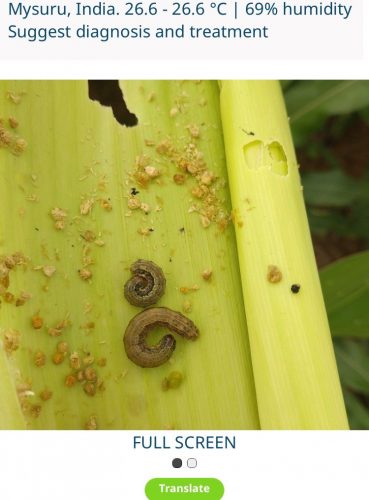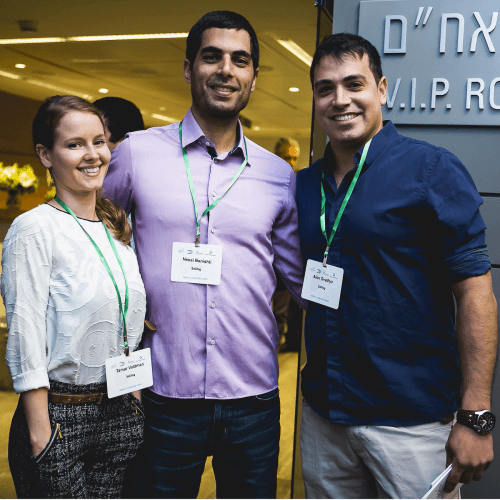The company has developed an application that is used by farmers around the world who take pictures of pests, an artificial vision system identifies them and sends them the protocol for exterminating the discovered pest. Recently, the company went through another phase when its software was used to predict the spread of a particularly violent pest - fall armyworm - from Africa to India. An interview with the company's CEO Nesi Benishti

Israeli startup company Saylog discovered an outbreak of the fall armyworm, which is capable of eliminating huge areas of corn in a short time, using an image-based artificial intelligence system that it developed, Agrio-Shield.
"A year and a half ago I founded Saylog and we developed an application whose purpose is to help small farmers mainly in the developing world who need help in identifying pests, diseases and other problems of plants which, in the end, if not treated, cause nutritional deficiencies for the population that depends on them." Says the CEO of Sailog, Nesi Benishti in an interview with the Hidan website. "Our system is able to identify hundreds of diseases, pests and deficiencies in plants, and it is already used by about 150 farmers around the world. But especially we are receiving attention because of the detection of the pole armyworm epidemic in a new area it has invaded."
Benishti: "I am a graduate of both startups in the world of medical devices. A year and a half ago I came across the problem of pests in agriculture, and I realized that this is a problem that can be solved using visual pattern recognition technologies, or artificial vision. I know that this technology is mature, and that it can actually replace manual, labor-dependent work with a machine."
"Poll armyworm creates a humanitarian problem in Africa when the pest causes billions of dollars of damage per year to agriculture on the continent. The American organization, USAID, It is suspected that the pest can spread to India. "
"We started training our detection system to be able to differentiate between the pole armyworm and other pests after the company was chosen to participate in the challenge which placed USAID to fight the pest in Africa, along with 19 other companies."
"The spread did happen as we observed in mid-July, and only on July 30 did the Indian government issue an official warning. If the pest spreads in India as it did in Africa, it is about billions of dollars worth of damage and a food shortage in the populated country."

"Approximately 150 farmers around the world already use Saylog's software. When a farmer reports the pest to us and the computer vision system recognizes the worm in the photo he took, we send him a protocol on how to eradicate the pest, but also alert other farmers in the area, who knew how to prepare, and as soon as they see one infected plant, to act immediately. For example, we helped stop an epidemic in India that originated from the virus that attacks chili pepper plants (CHILLI LEAF CURL VIRUS).
"We have been following Paul Army-Worm especially since we won the USAID tender in Africa. This pest has caused a humanitarian problem in Africa and damages of billions of dollars, mainly to corn crops. Because of its rapid rate of spread, it can eliminate tumors over a large area within a few days."
"From here came the "call" of the American government for solutions to monitor the pest. As soon as it is identified, there is an ability to treat it and even eradicate it and limit the spread. What is missing is the awareness of farmers and their ability to be prepared for the arrival of this pest. Because it is so destructive, the hand needs to be on the pulse and take care of it very quickly as soon as it arrives."
"But as mentioned, beyond treating the individual farmer, we get a picture of the spread of pests in the world and can predict trends of spread. We know the Pole Army-Worm from our operations in Uganda. During July we started receiving pictures of him from India and started investigating."
"The researchers working in the field at the academy have suspected for a long time that this pest would spread to the Middle East and Asia, and this is a suspicion that has been talked about for a long time. We were the first to see that the pest had arrived in India and we are helping to eradicate it. We do not know if our response was successful enough because we serve tens of thousands of farmers , not a layout that allows all farmers to be alerted, but we were the first to identify it with the help of an algorithm when the first instance appeared in the field."
"The authorities in India issued an alert on July 30, about two weeks after us, and even then they issued a directive to universities. The role of the universities in India is to go out and convey the message to the farmers. It is a long and uncertain process that reaches all farmers. In our algorithm, it's a matter of seconds until the protocols reach the farmers' mobile phones."
Benishti points out that there is a high fear that the army worm will reach Israel and therefore the Ministry of Agriculture carries out inspections at the borders.
Benishti adds that the software has been praised by the experts. "Nvidia, a world leader in the field of artificial intelligence, wrote in praise of the system and noted that the accuracy of the algorithms is At a very high level After experimenting with the solution, we were named in Forbes Fighters against food loss. "

4 תגובות
Pine
Microsoft, Apple, Amazon, Google and Intel were also start-up companies.
Stunning
interesting and important,
It is worth noting that the pest is Spodoptera frugiperda
A relative of the infamous Prodonia that made names
In agriculture in Israel in general and mainly in cotton fields,
It is also allowed to call the pest by its scientific name Spotoptera...
It's amazing what one startup can change. Who would have believed that a farmer who works with equipment that is very outdated compared to western agriculture could get such a quick indication with such a simple and accessible means.
Stunning.